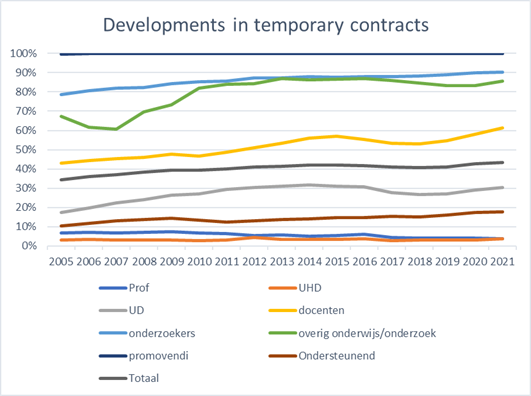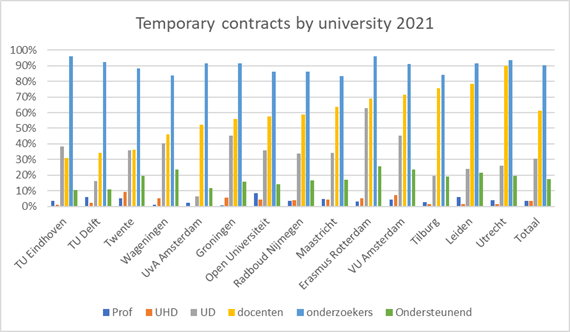UU topping the list one more time
Number of temporary contracts at universities rises again despite protests

Professors and associate professors are barely affected by this issue (document in Dutch only, Ed) as almost all of them hold permanent positions. But, the lower one goes down the academic career ladder, the farther job security is from the norm.
Currently, thirty percent of the teaching staff also conducting research are working on a temporary contract. That is one percentage point more than last year, despite all the efforts and resolutions announced by the universities to ensure more employees will be given permanent contracts.
Among the teaching staff without research duties, the figure is twice as high: 61 percent. A few years ago, it was only 53 percent and in 2005 it was even less: 43 percent. How universities treat this type of employer is the subject of much controversy.
But support staff are increasingly being appointed for a fixed period as well. This figure once stood at 10 percent, then for years it hovered around 15 percent, but in the past few years it has crept up to 18 percent.

Image: courtesy of HOP. Source: Universities of the Netherlands (data excl. the healthcare sector).
There are notable differences between universities on this issue. Utrecht University remains the champion of temporary contracts: no less than 90 percent of its teaching staff do not have permanent contracts. At the other end of the spectrum is the Eindhoven University of Technology, where only 31 percent of teachers without research duties are hired on a temporary basis.

Image: courtesy of HOP. Source: Universities of the Netherlands (data excl. the healthcare sector).
Without addressing these differences between universities, the minister offered an explanation for the increase: he says it has to do with the temporary resources needed to address the impact of the Covid-19 pandemic. According to him, the effect of recent collective labour agreements on permanent contracts is not yet reflected in the figures shown above.
Dijkgraaf previously stated that he would like to push hard for more permanent contracts in the higher education sector. Two of the approaches to reach that goal is setting up starting grants for new university teaching staff and attaching conditions to the sector plans that universities are required to draw up collectively.
Unions and protest groups have been campaigning against temporary appointments for years. Employees of the University of Amsterdam even held a partial strike, refusing to grade students’ work in a move to force the university to create more permanent positions. Here in Utrecht, a teacher that felt as though he was "disposable" took the university to court for denying him a permanent contract. He did not win the case, however.
In court, Utrecht University argued that it is working on hiring lecturers that can be given a permanent contract, a goal for which it has earmarked a specific budget. Nevertheless, there are still critical voices in the university calling for permanent contracts to current teachers who don't have research duties but do have a PhD degree.